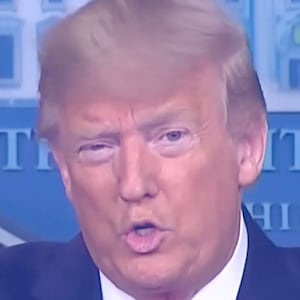All of official Washington has come to an agreement that swift, bold action is needed to counteract the dramatic economic impact of the coronavirus’ spread. But negotiations around such a package have been complicated by the fact that President Donald Trump can’t stand the idea of negotiating one-on-one with his chief counterpart, Speaker of the House Nancy Pelosi. Indeed, he suspects that she would use the moment to try to humiliate him.
Two senior Trump administration officials described a president who, out of an intense bitterness toward the House Speaker, has shuddered at the prospect of being in the same room with her during the ongoing public-health crisis and economic reverberations.
Instead, Trump has deputized some of his more prominent lieutenants to handle the delicate negotiations. Treasury Secretary Steve Mnuchin, in particular, has emerged as one of the administration’s top envoys to Capitol Hill, as Team Trump and lawmakers attempt to cobble together some form of economic stimulus in the wake of a now-declared global pandemic.
ADVERTISEMENT
“At this time, the president does not see it as productive to [personally] negotiate directly with Nancy Pelosi,” said one of the senior administration officials. “For now, it’s best for her to deal directly with Sec. Mnuchin and others in the administration.” The official recalled how Trump bristled at Pelosi for, in the president’s estimation, “immediately” leaving recent private meetings the two had to leak its contents and try to, in the source’s characterization, “make the president look bad and score political points.”
“When you’re in the middle of a public health crisis, you don’t need that kind of theater,” this official added.
Fears of that happening have animated the president as he has charted out a response to the growing coronavirus threat. During one recent meeting, the president mentioned that he didn’t want to “waste my time” right now “with Nancy” and Democratic leaders given how “horrible” Pelosi has been lately, according to a person with knowledge of the meeting. At the same meeting, the president made sure to specifically reference Pelosi tearing up a physical copy of his “beautiful” State of the Union speech, as a reason for him believing discussions with her would be fruitless.
Accordingly, while Mnuchin and Pelosi have spoken several times this week—including at an in-person meeting in the Speaker’s office on Tuesday—the president and the Speaker have not spoken at all in recent days, according to her office. The president has also not spoken to Democratic Senate leader Chuck Schumer (D-NY), according to his office.
At a moment when federal officials are attempting to swiftly address an growing biomedical crisis, the inability of the legislative and executive branches to communicate at the highest levels would seem suboptimal. Whether that lingering animus between Pelosi and Trump will ultimately doom a legislative response to coronavirus seems unlikely, however.
House Democrats are planning to unveil a package on Wednesday that targets their specific coronavirus relief priorities: expanding paid sick leave and unemployment insurance, beefing up federal labor protections for health care workers, and broadening access to food stamps and free school lunches.
The refrain from Democrats on both sides of the Capitol has been that the most effective way to mitigate the economic effects of the virus is to implement measures that help to slow its spread—like sick leave, which would make it easier for people to stay home.
Trump has reportedly been willing to consider backing Democratic-endorsed measures. But his own approach—at least publicly—looks quite different. The administration has floated targeted relief to industries economically harmed by the virus’ spread, such as the hotel, airline and cruise ship businesses. And it has embraced the idea of a lengthy, if not permanent, payroll tax cut to get more money directly to employers and employees.
Congressional Republicans have sounded squeamish about the price tag for a stimulus measure like the one Trump may be envisioning, and on Wednesday several said that they would be open to quickly passing a House Democratic-drawn bill. After Trump visited them for lunch on Tuesday, Senate Republicans sounded uncertain as to when the White House would roll out a specific set of proposals. But they were certain the president wanted swift action.
“The president sort of pitched a number of ideas that his team has looked at and recommended them for consideration,” said Sen. Josh Hawley (R-MO). “What was clear was that he certainly urges action and thinks action should be taken soon. I think he would prefer sooner rather than later.”
In that vacuum, Pelosi is making her play. By moving quickly—with a vote possibly as soon as this week—Democrats have an opportunity to set the legislative framework for the debate on how to respond to coronavirus, possibly boxing in the White House and Senate Republicans.
Rep. David Cicilline (D-R.I.) said Democrats should work with Republicans on areas of common concern, but “if the Senate is unwilling to engage in a serious way on that, then my hope would be that we would move forward on what we think is right and then press them to adopt what the House does.”
But most on the Hill, in either party, recognize that whatever agreement does take shape is going to have to go through Pelosi and Trump—no matter how abysmal their relationship may be.
“We need a two-way agreement between the House and the President,” said Rep. Hakeem Jeffries (D-N.Y.), a top-ranking House Democrat. “And if we reach that agreement, I'm confident that we'll be able to move a bill through the Senate… We did that on criminal justice reform, we did that on the U.S.-Mexico-Canada trade agreement… We’ll have to do it in this particular instance as well.”








